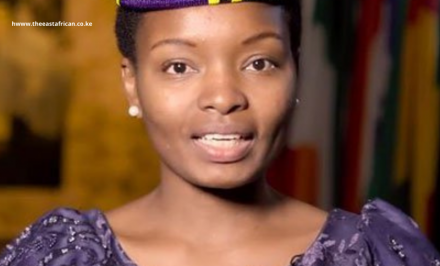 Cameroon : Dr. Yasmine Ndassa, the research scientist turned data storyteller
Cameroon : Dr. Yasmine Ndassa, the research scientist turned data storyteller
 Julien Ngum Che : advocating for the rights of displaced women and youth in Cameroon
Julien Ngum Che : advocating for the rights of displaced women and youth in Cameroon
 Chilufya Mutale Mwila, the Zambian entrepreneur driving financial inclusion across Africa
Chilufya Mutale Mwila, the Zambian entrepreneur driving financial inclusion across Africa
 Wangari Muchiri, the Kenyan engineer committed to accelerating the ecological transition in Africa
Wangari Muchiri, the Kenyan engineer committed to accelerating the ecological transition in Africa


Thanks to the commitment and activism of Tanzanian lawyer Rebeca Gyumi, the law allowing girls to be married at 14 with a court order and at 15 with parental consent has been repealed. The minimum age for marriage in Tanzania is now 18. This has enabled many girls to continue their education.
In 2019, Tanzania’s High Court declared unconstitutional the sections of the Marriage Act that made it possible for 14-year-old girls to be married. This was a major achievement for the promotion of women’s rights in Tanzania, thanks to the hard work of lawyer Rebeca Gyumi.
As a law graduate from the University of Dar es Salaam in Tanzania, she practices as a lawyer and is involved in youth and women’s rights issues. She worked in different organisations promoting youth rights. Among others, she worked for 8 years with the youth organisation Femina. In 2012, she was the coordinator of the national campaign under the government led by Tanzania Education Authority (TEA). The aim of this campaign was to raise funds to build hostels for girls who are forced to drop out of school because of the long distances between their homes and school.
In 2013, the United States Embassy in Tanzania selected her to participate in the International Visitor Leadership Program for Youth with Leadership Potential.
She also militates, in particular in favor of the rights of young girls and was involved in several campaigns, such as “Girls not Brides” whose aim was to mobilize resources to fight against child marriage in the world. At the same time, she founded “Mischana Initiative”, a Tanzanian NGO whose mission is to empower girls through education and to face the main obstacles that prevent girls from enjoying their right to education.
In this context, in 2016, as a lawyer, she filed a petition against the legal texts allowing child marriage in Tanzania, notably the Tanzanian Marriage Act of 1971. For several years, she mobilised for Tanzanian law to promote gender equality and women’s rights in the country. In 2019, she won her case. The law on marriage was declared unconstitutional and the age of marriage was raised to 18. A considerable step forward for the promotion of women’s rights in Tanzania.
Because of her commitment to promoting the rights of young people and girls, she obtained several distinctions. In 2016, she won the “International Visitor Leadership Program Alumni Award” in the category of Social Innovation and Change. In 2018, she received the Tanzania Women Achievement Award. That same year, she also won the United Nations Headquarters Award in the United Nations Human Rights category. In 2020, she was ranked in the BBC’s 100 Women List.